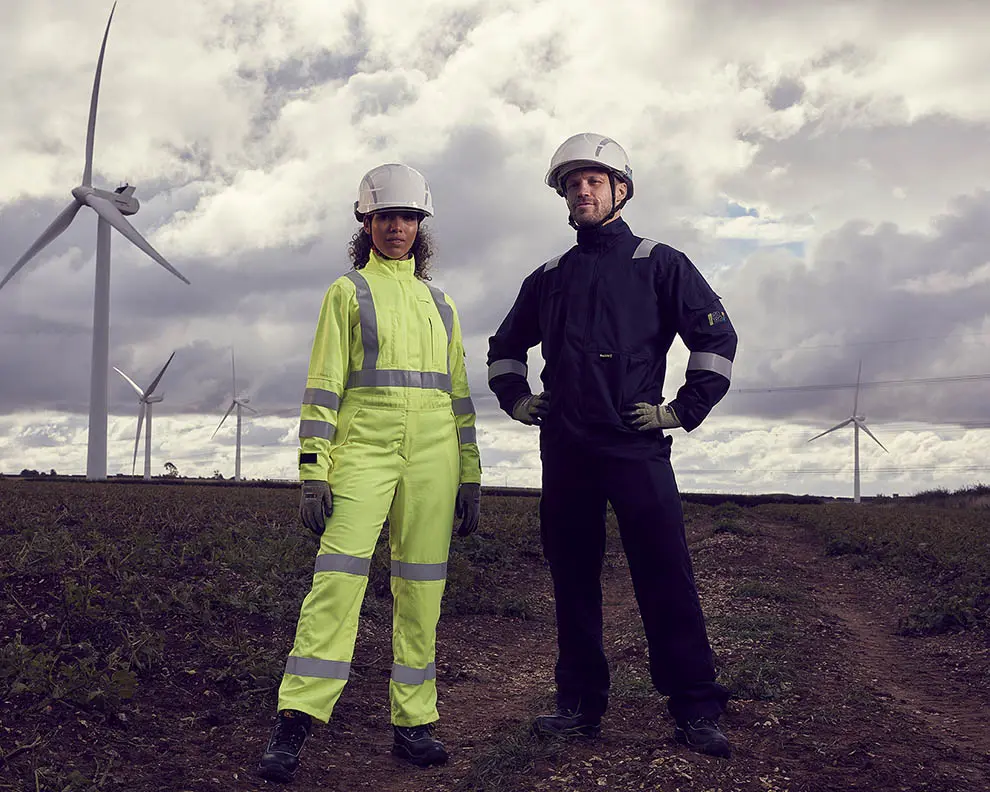
Essential PPE in the Food Industry: What You Need to Know
Overwhelmed by PPE options for food safety? Master your PPE selection for food workers safety with these practical tips.

Get 20€ off on your first order!
Looking for the right Arc Flash Coveralls for your workplace? This guide will help you choose the best coveralls by covering key factors like safety ratings, materials, design, and fit. By the end, you’ll have all the information needed to make an informed decision. We’ve also highlighted trusted suppliers to help you find quality options. Plus, we’ll guide you on complementary protective gear for complete safety. Let us help you find the perfect solution today.
Arc Flash Coveralls, also known as flame-resistant coveralls or fire-resistant coveralls, are specialized protective garments.
While flame-resistant and fire-resistant terms are often used interchangeably, they both refer to materials designed to resist ignition and self-extinguish once the flame source is removed. Coveralls are essential for providing a protective barrier for workers in high-risk environments.
Commonly used in Europe across industries such as Electrical Maintenance and Power Plant Operations, these coveralls meet stringent safety standards to ensure maximum protection. Explore a wide selection of Arc Flash Coveralls.
When selecting Arc Flash Coveralls, focus on the following critical factors:
Ensure the coveralls meet European safety standards such as EN 61482, which specifies the test methods and performance requirements for protective clothing against the thermal hazards of an electric arc. This ensures the clothing can withstand specific arc flash energy levels.
These ratings determine the level of energy resistance, helping you choose the right level of protection for your workplace. Learn more about EN Standards from this guide in Wikipedia.
Materials like aramid blends or cotton with flame-resistant treatment each offer unique benefits. Aramid blends provide high durability and consistent flame resistance, while treated cotton is often more affordable and breathable.
Adding a comparison chart could simplify decision-making for specific needs. are popular for their durability and comfort. Breathability and moisture-wicking properties are essential for comfort during long shifts.
Features such as reinforced seams, elasticated cuffs, and multiple pockets enhance usability and durability. Adjustable fits enhance both protection and comfort for a secure, tailored experience.
Proper fit is crucial for safety and ease of movement. Refer to the sizing chart provided by suppliers like Portwest, Unigloves, and Fristads.
Here is a quick comparison of leading European suppliers:
| Supplier | Key Features | Catalog Link |
| Portwest | High durability, modern designs | Explore Portwest |
| Unigloves | Lightweight, breathable fabrics | Explore Unigloves |
| Fristads | Innovative safety technologies | Explore Fristads |
| Pricing Comparison | Overview of cost ranges for different protection levels | Pricing varies by material and design, inquire within catalogs |
Choosing the right fit is essential for mobility and safety. Properly fitted coveralls ensure ease of movement and comprehensive protection. Refer to supplier-specific sizing guides, and consider the following:
Arc Flash Coveralls are indispensable in many European industries:
To maximize the lifespan and effectiveness of your coveralls, ensure proper storage and maintenance:
Purchasing from reputable suppliers like Portwest, Unigloves, and Fristads guarantees compliance with European safety standards. Explore their full catalogs for high-quality options:
While Arc Flash Coveralls are critical, combining them with other protective gear ensures comprehensive safety. Explore related categories:
For detailed buying tips, check out related guides like How To Choose The Right Arc Flash Jackets.
We hope this guide has been helpful in navigating the essential factors for choosing the best Arc Flash Coveralls, from safety ratings to material composition. Whether you’re working in electrical maintenance or power plant operations, we’re here to support your safety needs.
Explore the full range of Arc Flash Coveralls on Droppe, where trusted brands like Portwest, Unigloves, and Fristads are just a click away.
Have questions or need advice on finding the perfect coveralls? Don’t hesitate to reach out—we’re always here to help ensure your safety and confidence in every purchase.
– The Droppe Team
Coveralls are specifically designed to protect against electrical arc hazards, while Flame-Resistant Coveralls offer general fire protection.
Yes, many Arc Flash Coveralls are made with breathable materials to ensure comfort in warmer conditions, though choosing the right fabric is essential.
Replace them when they show signs of wear, such as holes or damaged seams, or after any significant exposure to electrical hazards.
Some models are designed to be water-resistant, but not all Arc Flash Coveralls are fully waterproof. Check product details for specific features.
Yes, coveralls come with various arc protection ratings (e.g., ATPV), allowing you to select the appropriate level based on your job’s hazard risk.
Thank you! You've signed up for our newsletter.



















Overwhelmed by PPE options for food safety? Master your PPE selection for food workers safety with these practical tips.

Struggling to maintain clear vision in demanding environments? This guide is here to help. By the end, you’ll know exactly...

Electricians across Europe face unique challenges that require reliable safety glasses to ensure both protection and efficiency. Whether safeguarding against...

Overwhelmed by PPE options for food safety? Master your PPE selection for food workers safety with these practical tips.

Struggling to maintain clear vision in demanding environments? This guide is here to help. By the end, you’ll know exactly...

Electricians across Europe face unique challenges that require reliable safety glasses to ensure both protection and efficiency. Whether safeguarding against...
Get 10€ off on your first order!
Save 30% by buying directly from brands, and get an extra 10€ off orders over €100
Save 30% by buying directly form brands, and get an extra 10€ off orders over €100